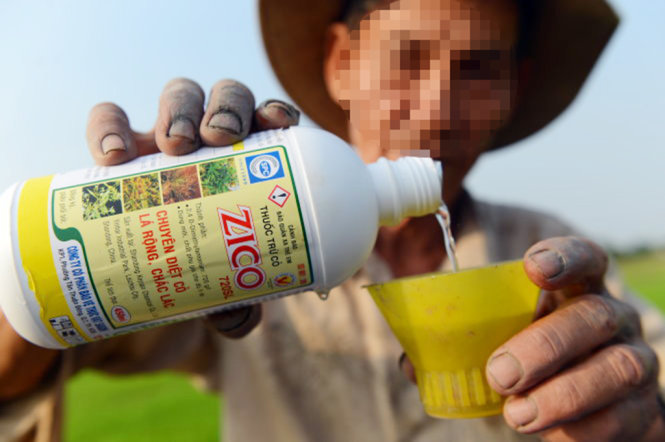Vietnam’s agriculture ministry has decided to remove two toxic compounds from the list of allowed ingredients of plant protection drugs, only after various products containing them have been used widely for ages in the country.
The ministry has also caused widespread worries for generously allowing production and imports of the organic compounds, as well as their sales, to continue for another one and two years, respectively, instead of an immediate ban and products recall.
On February 8, the ministry confirmed that 2,4D and Paraquat, found in a wide variety of weedkillers popular to farmers across Vietnam, are dangerous substances that may cause eye damages, cancers and serious environmental consequences.
The ministry has therefore removed four 2,4D-contained herbicides, and 46 weedkillers with Paraquat among their ingredients, from the list of permitted plant protection products in the country.
However, products with these two compounds are allowed to be on sale and circulation for another two years, while imports and production can continue for one year, before the ban comes into effect.
Even the agriculture ministry admitted in its February 8 directive that plant protection drugs containing the compounds are being used in various crops, from rice and corn to sugarcane and coffee, by local farmers.
As observed by Tuoi Tre (Youth) newspaper, such herbicides remain easy to buy as candy as few farmers or sellers ever heard of their toxic natures or the upcoming ban.

Le Quoc Cuong, deputy director of the Southern Plant Protection Center, headquartered in Tien Giang Province, hailed the ministry’s decision as good news as weedkillers containing these cancer-causing compounds have been widely used in the Mekong Delta.
According to Cuong, both compounds are ‘close relatives’ to dioxin, an extremely toxic substance that causes birth defection and child cancers.
“Many countries, including even China, have banned products with 2,4D and Paraquat contents, but Vietnamese farmers are using them en masse,” Cuong said.
However, the one-year and two-year windows given to the production, import and use of these dangerous products before the ban takes full effect are raising concerns among local experts.
Dr. Nguyen Dang Nghia, director of the Tropical Agricultural Research and Consultancy Center in Ho Chi Minh City, said some countries began to raise alarm on the hazardousness of 2,4D and Paraquat as early as 20 years ago, so Vietnam’s action came just too late.
With products with those compounds having been used for years, they may have already affect the health of a number of people via residues in the plant products, Nghia said, before questioning “who will be responsible for this?”
Despite all these concerns, Hoang Trung, head of the Plant Protection Authority under the agriculture ministry, asserted to Tuoi Tre that the ban is done as per international practice and “not too late.”
Like us on Facebook or follow us on Twitter to get the latest news about Vietnam!

























































